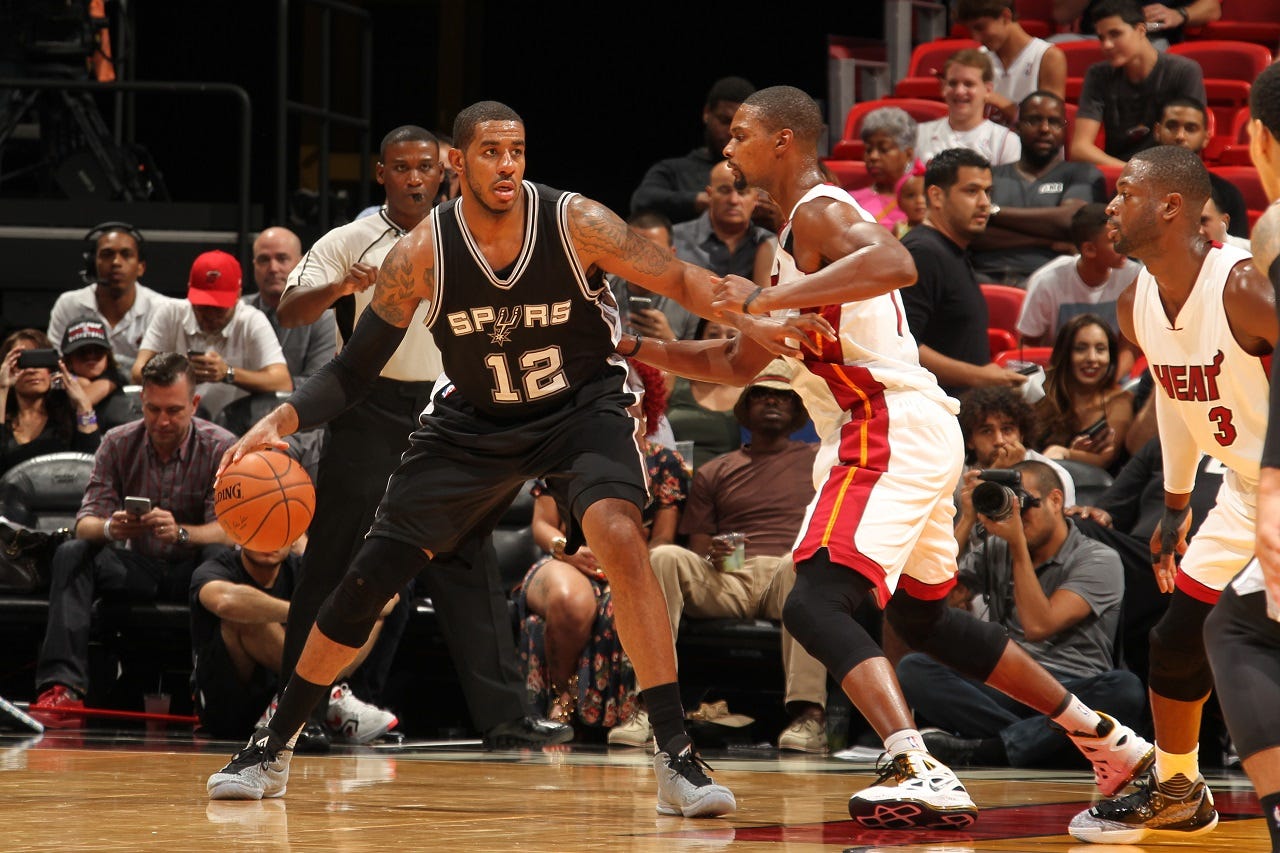LaMarcus Aldridge made a brave decision
I know what it’s like for a career to end early because of an injury. It’s hard, but trust me: your best days are still ahead
Like everyone else who pays attention to basketball, I was shocked this week at the news that LaMarcus Aldridge was retiring. Over fifteen lights-out seasons in the NBA, LaMarcus became a seven-time All-Star, with a fadeaway jumper you just had to admire, even if he was draining it in your face. But he also became the kind of player you could develop a relationship with from the stands or through the TV: a big man who could run the court and put up big numbers on both sides of the ball—and never let his head get too big about it.
I first saw LaMarcus play back before either of us made it to the league. This was 21 years ago, if memory serves—a summer league game at Carter High School in Dallas. His coach, Robert Allen, had been mine, and here’s the thing about Coach Allen: That dude had a knack for talking shit.
So on that day during my senior year, he was gassing up the new guy who was coming to Seagoville High as a freshman. I looked across the court to see who he was talking about—and caught a glimpse of the tallest, skinniest freshman I'd ever seen.
Then I watched LaMarcus Aldridge actually play and realized Coach Allen wasn’t lying. There might’ve been two years between us, but he brought it, man. After that, we started working out together—before I went to college and even once I got there. Coming home for breaks, I always looked forward to putting up shots with someone I shared a hometown and a competitive streak with.
Three years into my NBA career, I was playing against LaMarcus again. He wasn’t the skinniest kid I’d ever seen anymore, but his love for the game, and the effort he put in, hadn’t changed. And that stayed true up until his final minutes of play: There wasn’t a game, wasn’t a quarter, wasn’t a play during which LaMarcus didn't leave everything on the court.
That’s what I thought of when I heard about the tough, brave decision he made this week. Because I realized, while his career may have been shortened, he got everything he could from it—just like I did before I had to hang it up for similar reasons.
Over the last chapter of his career, LaMarcus was dealing on and off with a medical condition: an irregular heartbeat. “For 15 years, I’ve put basketball first,” he wrote in the letter announcing his retirement. “Now, it is time to put my health and family first.”
It’s a tough decision to make, let alone in the middle of the season. In fact, I can’t even say it’s the one I would’ve made. I tried to keep playing even after I found out about the medical condition that led to my own retirement. It takes some nerve to risk your life to play ball, sure—but it takes real bravery to set that aside because you have a family to look out for.
That’s the choice LaMarcus made. And I’d say it requires a different kind of thinking than most pros are used to. Just take a look at the superteam he left: KD. Kyrie. Blake Griffin. Not every player could convince himself to leave a championship contending squad like that. But sometimes, the best decision isn’t the easiest one to make—that’s what I texted him the other day. And the mark of any good player or leader—hell, any good man—is the ability to act for the greater good of your team. In this case, that team was LaMarcus’ family.
I’ve already written about how leaving the league early is anything but easy. There’s no sugar-coating that. But here’s what’s also true: If you’ve succeeded at every level of sports, there’s any number of new chapters you can write for yourself. You already have the work-ethic. You already have the grit. You already know what it takes to compete at the highest level. And that’s a skill that translates to whatever’s next.
Knowing that doesn’t make retirement any sweeter, but it does pave a road forward. And in a situation like this, you’ve got one pocket ace: looking back at what you’ve accomplished—which is the reason you feel so torn up to begin with. Ultimately, it’s no use thinking about what could’ve been if you had more time. It’s much more valuable to celebrate what you were able to do in the time you did have.
LaMarcus played longer than I did, so I had the opportunity to watch him come into the league and follow his career until he left it—and I can say he will go down as one of the greats.
It’s funny to think about: We got started as two skinny kids battling it out to be the best player from Dallas. I’d say we both lived up to that promise—but now we’re faced with an even bigger challenge than what we did on the court: figuring out how to reinvent ourselves and hopefully become great at the next thing, whatever that next thing is.
—
My book, Letters To A Young Athlete, is out on June 1st—and you can pre-order it today. I’ve poured my all into this thing and can’t wait for you to read it.



